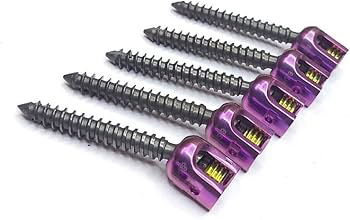In the modern Medical field, titanium alloy has become an important Material for orthopedic implants and Medical devices due to its excellent biocompatibility, high strength and corrosion resistance. As a professional manufacturer, JeaSnn focuses on the customized production of high-precision medical titanium alloy screws, from drawing design, material selection to precision processing, to fully meet the stringent requirements of the medical industry. This article will discuss in detail the key manufacturing links of customized medical titanium alloy screws.

1. Drawing design: precision and adaptability
The design of medical screws must be precisely adjusted according to the patient's anatomical structure and surgical needs. The design process mainly includes the following steps:
Specification parameter definition: Determine the thread type (self-tapping, self-drilling or standard thread), screw diameter, length, head shape (hexagonal, cross, star, etc.) according to the application scenario (such as orthopedic internal fixation, spinal implant or dental restoration).
Stress analysis: Finite element analysis (FEA) technology is used to simulate the stress of the screw under physiological load to optimize the structure and avoid the risk of breakage or loosening.
Surface treatment requirements: Surface coatings (such as hydroxyapatite coatings) or anodizing should be considered during the design phase to enhance bone integration.
JeaSnn's engineering team can optimize the design based on the CAD drawings provided by customers to ensure that the screws meet the high standards of medical applications.
2. Material selection: Application of high-quality titanium alloys
The selection of titanium alloys is critical to the performance of medical screws. Commonly used materials include:
Ti-6Al-4V ELI (Grade 23): This alloy excels in biocompatibility, mechanical strength and corrosion resistance and is widely used in orthopedic implants.
Pure titanium (Grade 2 or Grade 4): Used for medical devices with lower strength requirements but higher ductility, such as dental implants.
JeaSnn uses high-purity titanium alloy materials and conducts strict material testing (such as XRF spectral analysis, mechanical property testing) to ensure that the products meet medical standards such as ASTM F136 and ISO 5832-3.
3. Precision machining: CNC production and quality control
The manufacturing of medical screws requires high precision. JeaSnn uses advanced CNC Turning and milling technology to ensure that the product accuracy reaches the micron level (±0.005mm). Processing processes include:
High-precision turning: Use five-axis CNC equipment to process threads to ensure accurate tooth profiles and reduce surface defects.
Rolling thread technology: Compared with traditional cutting threads, rolling threads can improve the fatigue strength and durability of screws.
Deburring and polishing: Automatic deburring and ultrasonic cleaning technology are used to eliminate tiny burrs, improve finish, and reduce tissue irritation.
During the production process, each batch of screws must undergo three-dimensional coordinate measurement (CMM), roughness testing, and thread gauge testing to ensure that they meet strict medical standards.
4. Surface treatment and sterile packaging
The surface treatment of medical screws is crucial to improve biocompatibility and corrosion resistance. JeaSnn provides a variety of process options:
Anodizing: Enhances corrosion resistance, improves bone integration, and provides color coding for easy surgical identification.
Passivation treatment: removes free metal on the surface and improves antioxidant properties.
Plasma spray coating: such as hydroxyapatite (HA) coating, improves bone bonding ability.
All finished products are cleaned, sterilized (ETO gas sterilization or γ-ray sterilization) and sterile packaged in a clean room to ensure safe use.
5. Quality inspection and certification
JeaSnn implements strict quality control in each production link to ensure that the screws meet international medical device standards:
ISO 13485 quality management system: fully covers the medical device manufacturing process.
ASTM F136 & ISO 5832-3: ensure that the biocompatibility and mechanical strength of titanium alloy materials meet medical requirements.
Thread accuracy detection: use thread ring gauges and image measurement systems to ensure that dimensional tolerances meet specifications.
Tensile and fatigue testing: simulate the load conditions in the human body to verify the long-term stability of the screws.
6. Customized production service
JeaSnn can provide a full range of customized services according to customer needs, including:
Small batch rapid production: suitable for scientific research or personalized implantation of specific patients.
Special thread design: such as tapered thread and reverse thread to improve fixation stability.
Exclusive laser marking: serial number and brand logo can be engraved on the surface of the screw for easy tracking and management.
The manufacturing of medical titanium alloy screws involves precision design, high-quality material selection, high-precision processing and strict quality control. JeaSnn relies on advanced manufacturing technology and strict quality management system to provide high-performance customized screw products for the medical industry and promote the development of global medical technology.
If you have any needs, please contact JeaSnn for professional customized solutions!





 English
English

